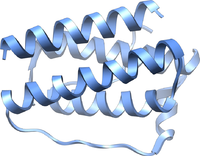
Photo from wikipedia
Objective The inability of leptin to suppress food intake in diet-induced obesity, sometimes referred to as leptin resistance, is associated with several distinct pathological hallmarks. One prevailing theory is that… Click to show full abstract
Objective The inability of leptin to suppress food intake in diet-induced obesity, sometimes referred to as leptin resistance, is associated with several distinct pathological hallmarks. One prevailing theory is that impaired transport of leptin across the blood–brain barrier (BBB) represents a molecular mechanism that triggers this phenomenon. Recent evidence, however, has challenged this notion, suggesting that leptin BBB transport is acquired during leptin resistance. Methods To resolve this debate, we utilized a novel cerebral Open Flow Microperfusion (cOFM) method to examine leptin BBB transport in male C57BL/6J mice, fed a chow diet or high fat diet (HFD) for 20 days. Results Basal plasma leptin levels were 3.8-fold higher in HFD-fed mice (p < 0.05). Leptin administration (2.5 mg/kg) elicited similar pharmacokinetic profiles of circulating leptin. However, while leptin reduced food intake by 20% over 22 h in chow-fed mice, it did not affect food intake in HFD-fed mice. In spite of this striking functional difference, hypothalamic leptin levels, as measured by cOFM, did not differ between chow-fed mice and HFD-fed mice following leptin administration. Conclusions These data suggest that leptin transport across the BBB is not impaired in non-obese leptin resistant mice and thus unlikely to play a direct role in the progression of pharmacological leptin resistance.
Journal Title: Molecular Metabolism
Year Published: 2018
Link to full text (if available)
Share on Social Media: Sign Up to like & get
recommendations!